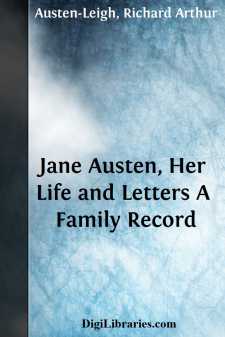Categories
- Antiques & Collectibles 13
- Architecture 36
- Art 48
- Bibles 22
- Biography & Autobiography 813
- Body, Mind & Spirit 142
- Business & Economics 28
- Children's Books 17
- Children's Fiction 14
- Computers 4
- Cooking 94
- Crafts & Hobbies 4
- Drama 346
- Education 46
- Family & Relationships 57
- Fiction 11829
- Games 19
- Gardening 17
- Health & Fitness 34
- History 1377
- House & Home 1
- Humor 147
- Juvenile Fiction 1873
- Juvenile Nonfiction 202
- Language Arts & Disciplines 88
- Law 16
- Literary Collections 686
- Literary Criticism 179
- Mathematics 13
- Medical 41
- Music 40
- Nature 179
- Non-Classifiable 1768
- Performing Arts 7
- Periodicals 1453
- Philosophy 64
- Photography 2
- Poetry 896
- Political Science 203
- Psychology 42
- Reference 154
- Religion 513
- Science 126
- Self-Help 84
- Social Science 81
- Sports & Recreation 34
- Study Aids 3
- Technology & Engineering 59
- Transportation 23
- Travel 463
- True Crime 29
Jane Austen, Her Life and Letters A Family Record
Categories:
Description:
Excerpt
PREFACE
Since1870-1, when J. E. Austen Leighpublished hisMemoir of Jane Austen, considerable additions have been made to the stock of information available for her biographers. Of these fresh sources of knowledge the set of letters from Jane to Cassandra, edited by Lord Brabourne, has been by far the most important. These letters are invaluable asmémoires pour servir;although they cover only the comparatively rare periods when the two sisters were separated, and although Cassandra purposely destroyed many of the letters likely to prove the most interesting, from a distaste for publicity.Some further correspondence, and many incidents in the careers of two of her brothers, may be read in Jane Austen's Sailor Brothers, by J. H. Hubback and Edith C. Hubback; while Miss Constance Hill has been able to add several family traditions to the interesting topographical information embodied in her Jane Austen: Her Homes and Her Friends. Nor ought we to forget the careful research shown in other biographies of the author, especially that by Mr. Oscar Fay Adams.
During the last few years, we have been fortunate enough to be able to add to this store; and every existing MS. or tradition preserved by the family, of which we have any knowledge, has been placed at our disposal.
It seemed, therefore, to us that the time had come when a more complete chronological account of the novelist's life might be laid before the public, whose interest in Jane Austen (as we readily acknowledge) has shown no signs of diminishing, either in England or in America.
The Memoir must always remain the one firsthand account of her, resting on the authority of a nephew who knew her intimately and that of his two sisters. We could not compete with its vivid personal recollections; and the last thing we should wish to do, even were it possible, would be to supersede it. We believe, however, that it needs to be supplemented, not only because so much additional material has been brought to light since its publication, but also because the account given of their aunt by her nephew and nieces could be given only from their own point of view, while the incidents and characters fall into a somewhat different perspective if the whole is seen from a greater distance. Their knowledge of their aunt was during the last portion of her life, and they knew her best of all in her last year, when her health was failing and she was living in much seclusion; and they were not likely to be the recipients of her inmost confidences on the events and sentiments of her youth.
Hence the emotional and romantic side of her nature—a very real one—has not been dwelt upon. No doubt the Austens were, as a family, unwilling to show their deeper feelings, and the sad end of Jane's one romance would naturally tend to intensify this dislike of expression; but the feeling was there, and it finally found utterance in her latest work, when, through Anne Elliot, she claimed for women the right of 'loving longest when existence or when hope is gone.'
Then, again, her nephew and nieces hardly knew how much she had gone into society, or how much, with a certain characteristic aloofness, she had enjoyed it....


